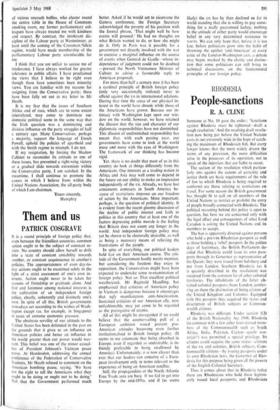Them and us
PATRICK COSGRAVE
It is a sound principle of foreign policy that, even between the friendliest countries, common action ought to be the subject of constant re- view. No country should allow herself to drift into a state of constant amiability towards another, or constant acquiescence in another's policies. The appropriateness of even day-to- day actions ought to be examined solely in the light of a strict assessment of one's own in- terests. Action ought never to be taken for reasons of friendship or gratitude alone. And first and foremost among national interests is the cultivation of an independent foreign policy, clearly, coherently and distinctly one's own. In spite of all this, British governments nowadays act according to the wishes of Wash- ington except (as, for example, in Singapore) in cases of extreme economic pressure.
The obstinate servility of our attitude to the United States has been defended in the past on the grounds that it gives us an influence on American policies and hence an influence in the world greater -than our power would war- rant. This belief was one of the minor casual- ties of President Johnson's Vietnam peace move. At Hoddesdon, addressing the annual conference of the Federation of Conservative Students, Mr Heath refused to comment on the American bombing pause, saying, We have not the right to tell the Americans what they ought to be doing or ought not to be doing.' Not that the Government performed much
better. Asked if he would act to re-convene the Geneva conference, the Foreign Secretary acknowledged the poverty of his position with the formal phrase, 'That might well be how events will proceed.' He had no thoughts on what Britain wanted to do, or how she might do it. Only in Paris was it possible for a government not directly involved with the war to exercise a marginal influence on the course of events when General de Gaulle—whose in- dependence of judgment could not be doubted —pressed the North Vietnamese Minister of Culture to advise a favourable reply to American proposals.
For more than half a century now it has been a Cardinal principle of British foreign policy (only very occasionally violated) never to offend against the us in international relations. During that time the areas of our physical in- terest in the world have shrunk while those of the Americans have grown. Because our in- timacy with Washington kept open our win- dow on the world, however, we have retained the illusion that the size and character of our diplomatic responsibilities have not diminished. This illusion of undiminished responsibility has meant that, with each passing year, our governments have come to look at the world more and more with the eyes of Washington. The framework of our thinking has become rigid.
Yet, there is no doubt that most of us in this country do look at things differently from the Americans. Our interests as a trading nation in Africa and Asia may well come to depend in the future on our ability to make an impression independently of the us. Already, we have lost armaments contracts in South America be- cause of restrictions impose(' on our freedom of action by the Americans. More important, perhaps, is the question of political identity. It is evident from the recent gloomy discussion of the decline of public interest and faith in politics in this country that at least one of the factors depressing public morale is the feeling that Britain does not count any longer in the world. And independent foreign policy may yet be shown to be electorally desirable, as well as being a necessary means of relieving the frustrations of the people.
In spite of everything, our political leaders hold fast on their American course. The atti- tude of the Government hardly merits mention, but considering the freedom they enjoy in opposition, the Conservatives might have been expected to undertake some re-examination of foreign policy. Not so. That excellent political weathercock, Mr Reginald Maudling, has emphasised that criticism of American policy in Vietnam is dangerous because it encourages that ugly manifestation. anti-Americanism. Sustained criticism of our American ally, now unfashionable, may yet come to be regarded as the prerogative of cranks.
All of this might be disregarded if we could believe that the countervailing pull of a European ambition would prevent pro- American attitudes becoming even further institutionalised in British foreign policy. (It seems to me axiomatic that being absorbed in Europe, even if regarded as undesirable, is in- finitely preferable to being swallowed by America). Unfortunately, it is now clearer than ever that our leaders can conceive of a Euro- pean involvement only in terms relevant to the experience of being an American satellite.
Still, the propagandists of the North Atlantic Free Trade area are busy If we fail to get into Europe by the mid-1970s. and if (as seems
likely) the us has by then declined so far in world standing that she is willing to pay some- thing for a really guaranteed lackey, nothing in the attitude of either party would encourage belief in any very determined resistance to NAFTA. We can only hope that, before it is too late, before politicians grow into the habit of throwing the epithet 'anti-American' at every critic of the London-Washington axis, a debate may begin, marked by the clarity and distinc- tion that some politicians can still bring to technical discussions, on the fundamental principles of our foreign policy.






































 Previous page
Previous page